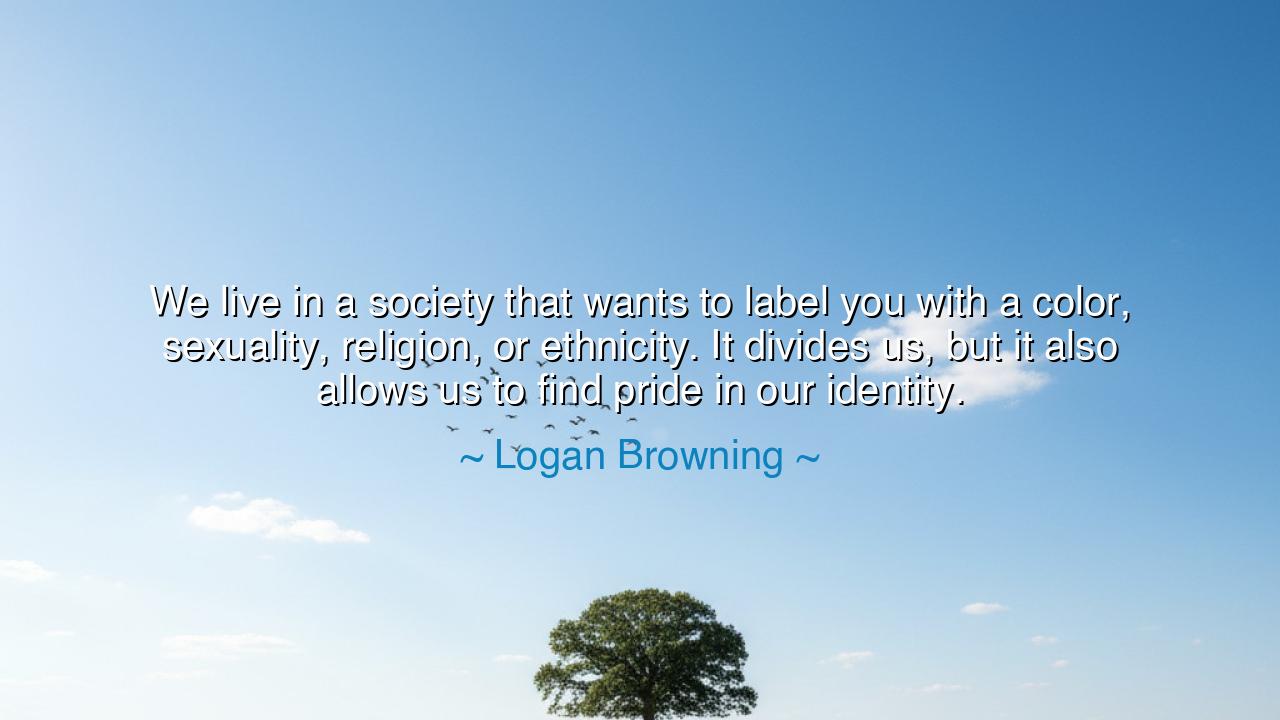
We live in a society that wants to label you with a color
We live in a society that wants to label you with a color, sexuality, religion, or ethnicity. It divides us, but it also allows us to find pride in our identity.






“We live in a society that wants to label you with a color, sexuality, religion, or ethnicity. It divides us, but it also allows us to find pride in our identity.” — these words from Logan Browning rise like a mirror held before the modern soul. Beneath their calm tone lies both a lament and a revelation — the lament of a world fragmented by division, and the revelation that even within these divisions, there lies a seed of strength. Browning’s insight reminds us that the forces which separate humanity can also awaken self-knowledge, that what is used to categorize can also be transformed into what is used to celebrate. Her words stand as both a warning and a blessing: identity can imprison us, or it can empower us, depending on how we understand it.
The origin of this quote lies in Browning’s reflections on her own experiences as an actress and woman of color navigating fame and representation. She speaks from the landscape of a world obsessed with labels — where society seeks to define individuals not by the light within them, but by the symbols upon them. Yet Browning does not reject these labels outright. Instead, she acknowledges the duality they carry: labels divide, but they also give belonging. They are the scars and the banners of humanity — reminders of the ways we have been wounded, and the ways we have healed.
To live in a world of labels is to walk a tightrope between individual truth and collective identity. Society, by its nature, desires order; it seeks to name, to sort, to understand. Yet in this act of naming, it often forgets the infinity of the soul. When one is called “Black” or “White,” “Christian” or “Muslim,” “gay” or “straight,” the world sees only the surface of being, not the river that runs beneath. But Browning’s wisdom lies in her recognition that these same names, once reclaimed, can become emblems of pride. What once chained us can become the symbol of our liberation — when we choose to define ourselves from within, not from without.
Consider the story of Nelson Mandela, who spent twenty-seven years imprisoned by a system that labeled him a criminal for the color of his skin and the cause of his freedom. The apartheid regime sought to reduce him to a number, a body without a voice. But Mandela refused the world’s label of inferiority. When he emerged from prison, he did not cast aside his identity as a Black man in South Africa; he embraced it as sacred, as a banner of endurance and reconciliation. In him, we see what Browning describes: the transformation of division into dignity, of imposed identity into chosen pride. What was meant to break him became his source of power.
In this way, Browning’s words call us to awareness, not denial. We cannot escape the fact that the world will always seek to name us, to fit us into its narrow definitions. But we can decide how we carry those names. To live wisely is to understand that our identity is not a prison cell, but a doorway. The labels of color, faith, or love need not divide; they can remind us of the richness of human experience, the infinite ways in which the divine expresses itself through flesh and spirit. To despise identity is to despise one’s story; to worship it is to forget one’s universality. Balance lies in honoring difference without losing unity.
Let us, then, be like the ancient mosaic makers, who gathered broken fragments and turned them into art. Each piece alone was imperfect — sharp, separate, incomplete — but together they formed a vision of beauty. So too with humanity: each label, each lineage, each faith and form contributes to the grand design of life. When we recognize this, our pride ceases to be vanity and becomes reverence. We no longer shout our difference to divide, but to declare: I am part of the whole, and the whole lives in me.
So, my child, remember the lesson hidden in Browning’s words. Do not allow the world’s labels to cage your soul, but do not despise them either. Learn who you are beneath them — and then rise above them, wearing your name as both armor and offering. Let your identity be a bridge, not a wall; a torch, not a weapon. Honor your heritage, but never let it blind you to the shared light in others. For though society may divide by name and color, the heart knows only one truth — that all are born of the same spirit, and all are destined to return to the same source.
And thus, as Browning reminds us, we live in a world of names — but it is we who must decide what they mean. To live nobly is to transform the mark of division into the language of unity, to turn the label into the story of becoming, and to walk this world not as one divided, but as one whole, radiant, and unashamed.






AAdministratorAdministrator
Welcome, honored guests. Please leave a comment, we will respond soon